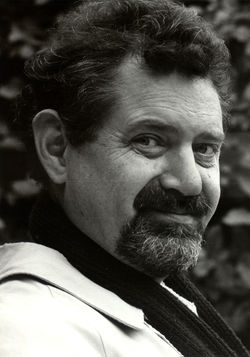Olsen, Poul Rovsing
Biography
Born: November 04, 1922
Died: 1982
Country: Copenhagen, Denmark
Studies: Copenhagen Conservatory (1943-46)
Teachers: Nadia Boulanger, Olivier Messiaen
Danish composer. He studied with Jeppesen at the Copenhagen Conservatory (1943-6) and with Boulanger and Messiaen in Paris (1948-9), then worked in Copenhagen as a music critic. His early works showed the influences of Bartók, Stravinsky and Nielsen, joined in the 1950s by 12-note serialism, but from the 1960s his music began to reflect his work as a musical ethnologist (A L′inconnu for voice and 13 instruments, 1962): he did fieldwork in Greenland and the Persian Gulf and taught at the universities of Lund (1967-9) and Copenhagen (from 1969). His output includes an opera, orchestral and chamber music, piano pieces and songs.[1]
Poul Rovsing Olsen was born into music. His father played cello and piano, his mother sang, and there were often private music soirees in his home. At an early age he was given ear training and piano lessons, and his obvious musical talent was ensured smooth development.
Poul Rovsing Olsen studied at the Royal Danish Academy of Music in Copenhagen, graduating in music theory and piano in 1946. Two years later he took a new degree in law at the University of Copenhagen. Thus equipped for the world, he went off to Paris, where he continued his musical studies with the famous teacher Nadia Boulanger and the composer Olivier Messiaen.
After his return in 1949, Rovsing Olsen unfolded the whole range of his talents. As a lawyer he worked until 1960 at the Ministry of Education, where he helped to draft the Danish Copyright Act. He worked as a musical writer on the newspapers Information and Berlingske Tidende, and he composed.
An interest in Oriental music aroused at an early age was greatly strengthened in 1958 when he joined the legendary excavations in the Arabian Gulf led by the Danish archaeologist professor P.V. Glob. Over the next few years, Rovsing Olsen returned to the Gulf States several times, and went on music-collecting expeditions to places as diverse as India, Egypt, Turkey and Greenland. The ethnomusicological expertise he thus acquired brought him wide recognition in specialist circles and led to a position as Keeper of the Danish Folklore Archives, where he was able to concentrate on the ethnomusicological work, and to the post as Chairman of the International Council for Traditional Music. Two results of his exploration of the musical culture of the Gulf States were the record Pêcheurs de Perles et Musiciens du Golfe Persique (Disques Ocora, OCR 42, 1969) and the book with three accompanying CDs Music in Bahrain. Traditional Music of the Arabian Gulf (Moesgaard Museum, Denmark and the Ministry of Information, Bahrain, 2002).
To his artistic credit Poul Rovsing Olsen has 85 compositions, including orchestral works, the ballets Ragnarok, La Création, The Wedding and The Outsider, the operas Belisa and Usher, songs, piano compositions and chamber music.
The research on the musical cultures of faraway countries left its mark on Rovsing Olsen’s own compositions. He aimed at clarity and substance, and by fusing elements from the Occidental and Oriental traditions he developed a personal musical idiom that was unusual in Danish music. Poul Rovsing Olsen himself said that it was his dream “to make music as direct as possible, to bring it closer to the listener”.[2]
Works for Percussion
Alapa-Tarana, op.41 - Multiple Percussion; Voice - Mezzo Soprano
References
